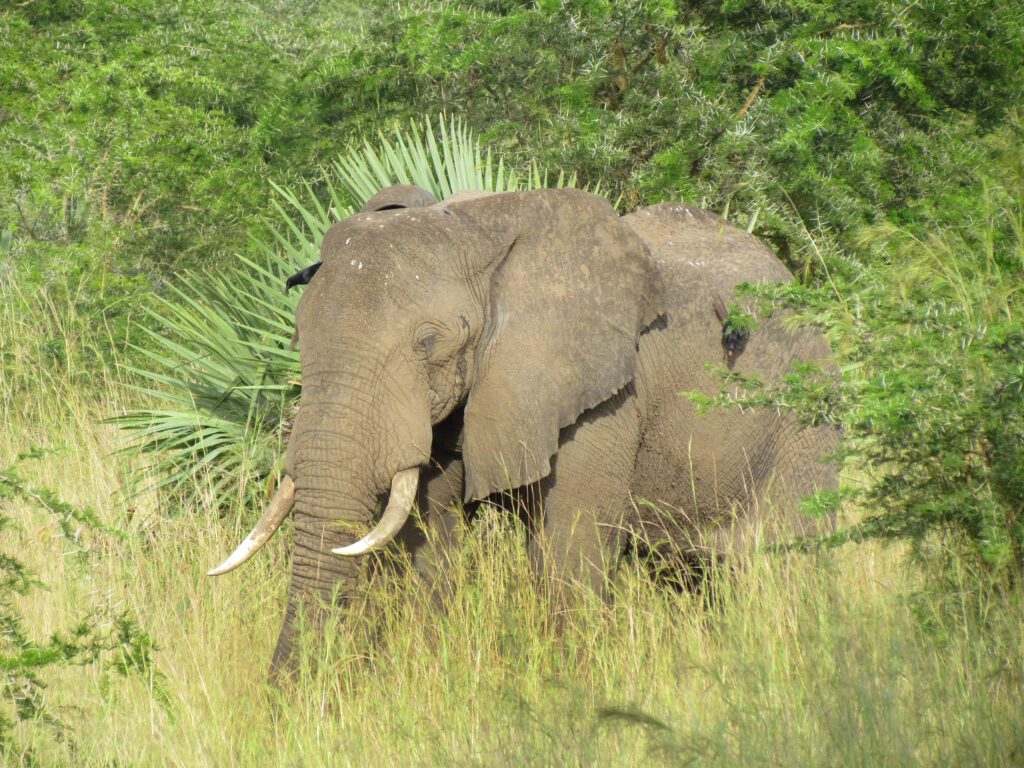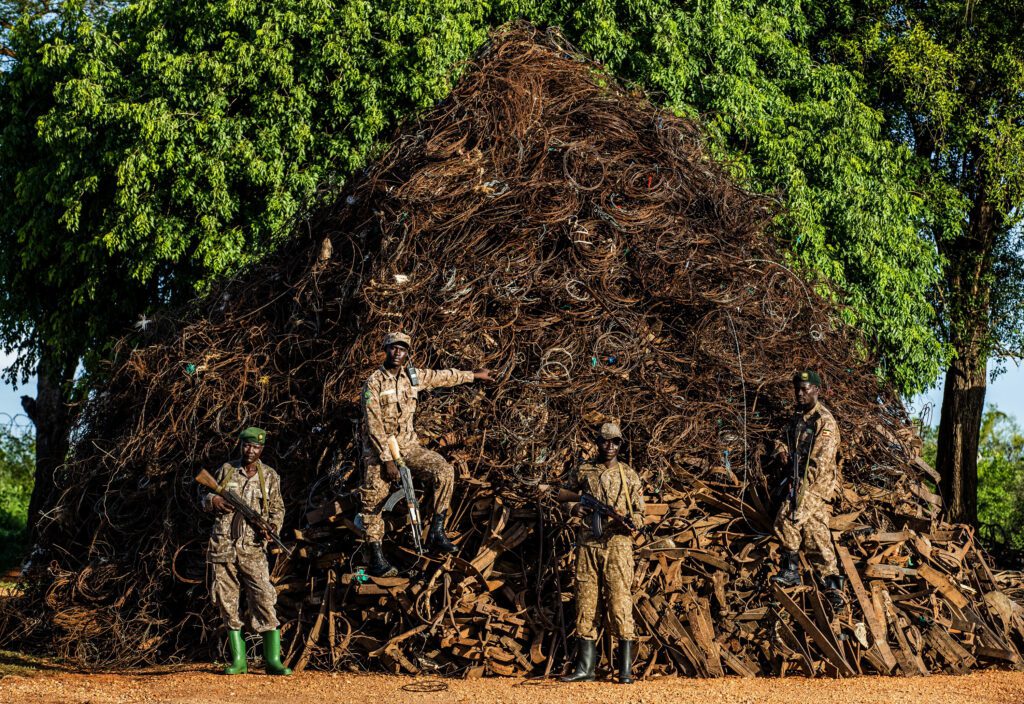This guest essay contributed by Sarah Conley, International Elephant Foundation, first appeared in our September 2023 edition of ZooNooz.
The incredible photo above is the work of esteemed photojournalist Paul Hilton who created this powerful visual representation of the battle against poaching. Titled “Snare Mountain” this photo shows over 12 tons of confiscated snares and leg-hold traps—only a fraction of what Uganda Wildlife Authority Rangers and Scouts find, remove and ultimately destroy every year.
Moving arm-in-arm as a line, stepping methodically, unarmed Scouts traverse through the heart of poaching country in Uganda identifying, dismantling, and removing snares. Their boots protect from briars and bites, but are no match for wheel traps which can close with enough force to crush a human leg. These Scouts do important work helping protect endangered and threatened species in Murchison Falls National Park (MFNP) and building Uganda Wildlife Authority’s (UWA) capacity to protect wildlife by providing extra manpower to the ranger force. Together the UWA Rangers and Scouts collected over 12 tons of snares and leg-hold traps in 2022 alone making a noticeable positive impact in the recovery of wildlife.
How did these 20 Scouts get there? Each from a poaching family, they are a part of a vital program to reclaim Murchison Falls National Park from poachers and wildlife criminals. Once a thriving habitat known as Uganda’s Jewel of the Nile, Murchison Falls was decimated during decades of war starting in the 1970s followed by the Lord’s Resistance Army’s reign of terror in the 1990s. As the people suffered so did wildlife, and the natural heritage of a beautiful land was in peril. Once political stability returned, the Uganda Wildlife Authority, with support of conservation organizations like the Uganda Conservation Foundation (UCF) and the International Elephant Foundation (IEF), has been able to begin to take back the land from poachers.
Over the past 10 years IEF has supported the construction of 15 ranger stations, a veterinary facility, and the Joint Operating Command Center (JOCC) which coordinates all of Murchison’s ranger and security operations. Recovered snares are used in the construction to fortify the foundations of these ranger posts, but more importantly eliminating the possibility they can ever be used again. As a result, the population of highly endangered Rothschild giraffe is up from 400 to 2,000, the elephant population has increased from 500 to 16,000, and the park’s lion population is also recovering. These efforts and more are helping Uganda return to its pre-war glory of being one of the very best places for wildlife tourism in all of Africa.
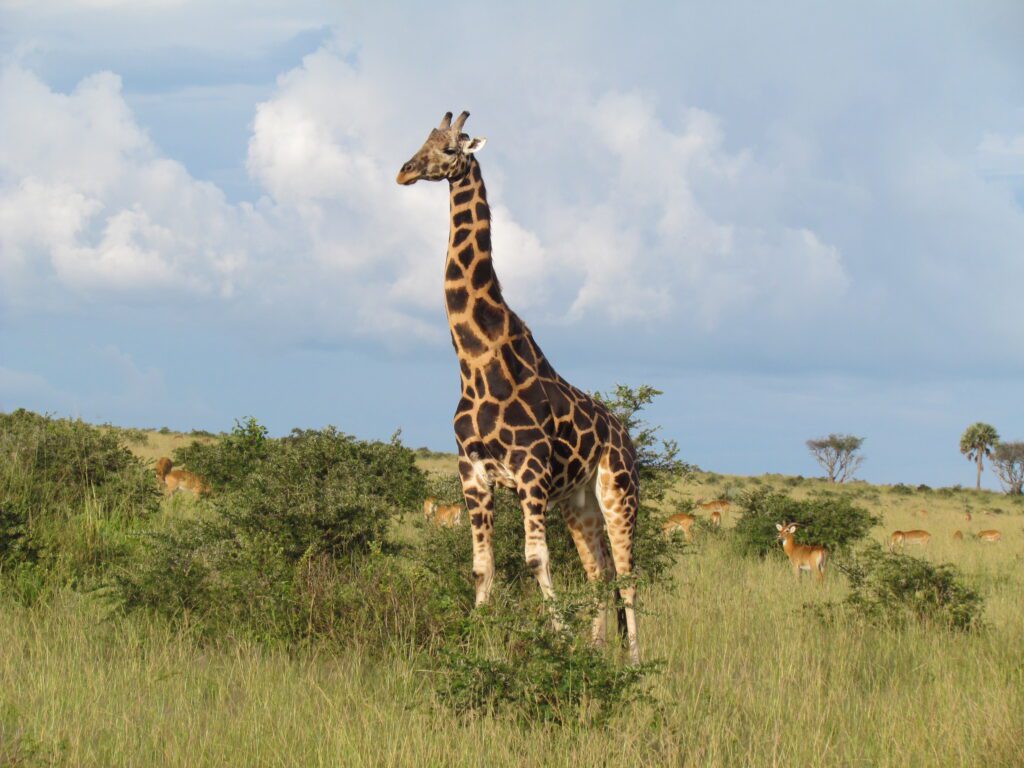

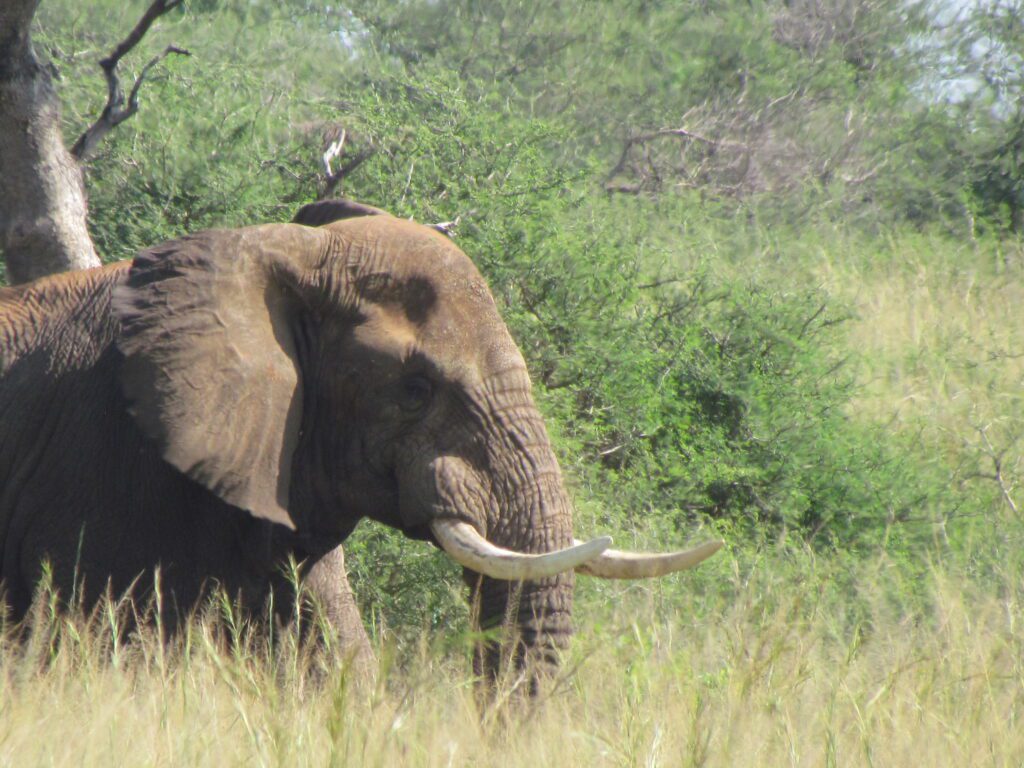

Securing habitat with new ranger stations is not enough. Changing the hearts and minds of the people and breaking decadeslong practices of illegal harvesting and other wildlife crime to make ends meet is the ultimate goal. This is where the Scouts Program comes in; it is the next step in building a sustainable conservation ethic for communities surrounding Murchison Falls National Park. Poaching is often a family business, with techniques, preferred spots, and networks passed down from generation to generation. But the dangers and risks are real. As Uganda as a nation recovers, families want better for their sons and daughters. The Scout Program was developed by UCF to stop the cycle of poaching within families. In exchange for a family commitment to stop illegal activities, one of their children is provided an education and taught employable skills like construction, painting, arboriculture, and wildlife protection.
A major component of their apprenticeship is working on the construction of ranger stations. This gives the youths opportunities for one-on-one time with rangers and helps develop relationships and respect for authority and the environment. After completing the program, the young men and women are aided in securing employment, and not surprisingly many express interest in becoming rangers and enter training through the Scouts Program.
Scouts are trained in low-risk ranger activities such as snare removal and boat operation and accompany rangers on regular patrols, helping to increase the capacity and effectiveness of security operations. They work as a team, helping to overcome the critical shortage of rangers and making the recovery of wildlife populations a reality. Their work brings new hope and a brighter future to the habitat, the scouts themselves, and their families. They become leaders in their communities and trusted Park ambassadors. Not surprisingly, there are many young adults and families eager to join this program.
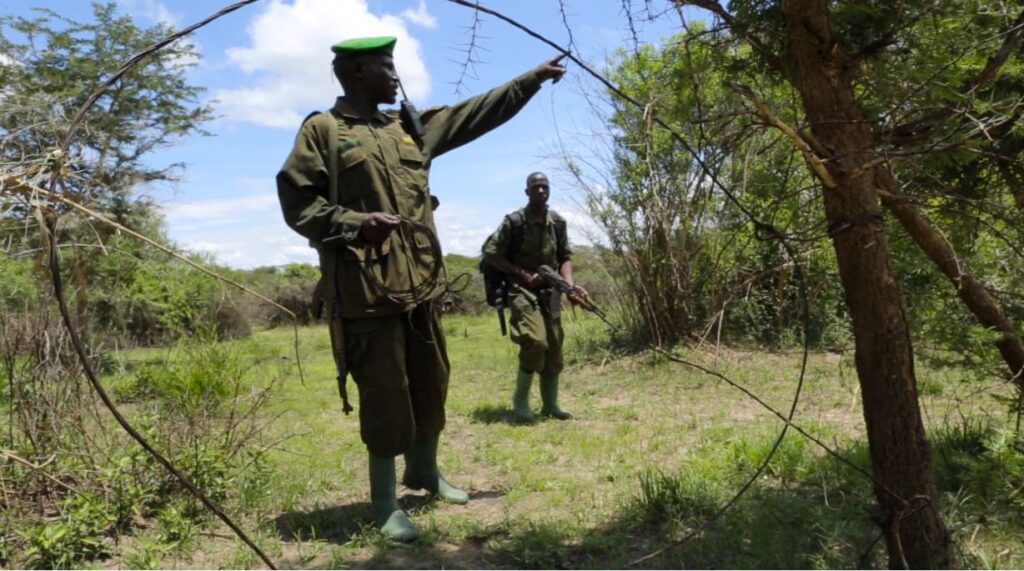

As important as this program is to the individual youth and their families, it is equally critical to Uganda Wildlife Authority’s mandate to secure and protect the wildlife of Murchison Falls National Park. The global shutdown in response to COVID-19 changed everything. Travel stopped and with it so did tourism which is the primary source of income for the government as well as a large percentage of the population. Park entrance fees fund rangers and patrols, many businesses from the travel to food and beverage industries to hospitality to city and country markets are reliant on tourist spending, and these businesses employ thousands of people in the cities as well as surrounding national parks. Out of work and looking for a way to feed their families, many people returned to family farms and hunting for bushmeat. Bushmeat is a generic term for meat from wildlife species hunted for human consumption which is illegal in national parks and designated areas throughout Africa and Asia. Unfortunately, bushmeat is an important source of protein and a cash-earning product in poor, rural communities.
As the economic effects of the pandemic put more pressure on habitats, it also put pressure on wildlife protection teams. Due to COVID-19, rangers were not hired to replace those who retired or otherwise left the force. That coupled with a ranger force already too small to fulfill the increased need to staff ranger stations as they were built throughout the park left large areas without surveillance simply due to a lack of manpower. Therefore, the scouts were a blessing as they were trained in critical routine roles which allowed rangers to move into the field for security patrols.
IEF’s commitment to the recovery of elephants, lions, giraffe, and more continues today. We are supporting the expansion of the Scouts Program to continue to bolster and increase the capacity of the existing rangers. We are proud to report that just when conservation work was needed most during the pandemic and nearly all of the avenues for support for rangers dried up, IEF not only fulfilled our commitment but in fact provided additional funds. It is due to our conservation partners like Seneca Park Zoo that we continue to fund the construction of rangers stations while supporting the brave men and women who are on the frontlines of protecting Murchison Falls National Park. The support of partners like the Seneca Park Zoo is what makes the difference between maintaining the conservation gains of the past decade and backsliding resulting in losing control to poachers and countless animals and habitat. Each ranger station constructed, each patrol, each snare the Rangers and Scouts remove holds Uganda’s past and signals her future where wildlife and people thrive together.
